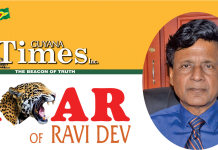March 2017 will be one hundred years since the Indentureship scheme that brought 238,907 men, women and children to this land was brought to an end. Since the 1970s there have been commemorations of the arrival of the first batch that landed on May 5th, 1838. After a sustained campaign by the community around the turn of the millennium, a Public Holiday was declared in 2004 to mark the event.
As one of those who played a role in that campaign, the groups with which I was associated always stressed the need for reflection by the community on the holiday, as to whether they had actually “arrived” to where or what their foreparents had been seeking. Whatever might have occurred during the 79 years of Indentureship, just as the 50th year of our achieving independence forced all Guyanese to examine our present circumstances and what we might do to improve the lot of our country going forward, the same can be done by Indian Guyanese, come March 12-20, 2017.
“What is the state of the Indian Guyanese community today and what can they do to create a more harmonious and prosperous country?” might well be a broad theme to be addressed. There is the foremost, the question of “identity” that inevitably keeps popping up. No one would claim that there have not been radical changes in the conception of who is an “Indian Guyanese” over the years. Have we become part of a “Calloo Nation”? Creolised? Hybridised? Or part of a “Rhizomatic identity” that encapsulates “multiplicity”? If so, to what extent have there been reciprocity in the rest of society sharing in the “Indian” part of our identity?
When Indians were first “contracted”, brought and placed to work on the sugar plantations, they were on the “bottom of the economic ladder” by whatever measure the society was using at the time. Economically, the last Household Income and Expenditure Survey (HIES) conducted at the turn of the millennium showed they were at the same dismal level economically as African Guyanese – the other large group in the society – and both were doing better than the Amerindians. Has anything changed since? Some analysts have claimed that with a PPP Government “favouring” Indian Guyanese that situation has changed? To what extent, if any, is this true?
Entering an already formed “Creole Culture”, Indian culture (with a small “c” or capital “C”) – and religion played a dominant role in defining their “cultural” responses and practices – Indians were derided as uncouth and card-carrying members of the great unwashed. Have their Cultural expressions – in song, dance, theatre, art, etc – been given an “equal place”? If not, why not? Is their everyday culture still seen as “backward country coolie”?
Politically – and this is the big enchilada in the room – Indians swung from just a handful qualifying for the franchise by the end of Indentureship – and consequently being out of the mainstream of politics – to becoming a majority by the middle of the twentieth century when Universal franchise arrived. Denied political office for the first quarter of a century after independence through rigged elections, and the legitimacy of their political vehicle challenged for the same period afterwards, Indian Guyanese have now seen their numbers amount to below 40% and shrinking. Exactly what form will their political participation take henceforth – and to what end?
Since the “end of Indian Indentureship” affected all the countries that received the “Girmityas” as they are called in Fiji – people of the “agreement” or “bound paper” – a central “Indian Diaspora Council” (IDC) is coordinating the “Commemoration of Centennial of Abolition of Indian Indentureship (CCAII)” in a host of countries – Fiji, Guadeloupe, Guyana, Jamaica, Malaysia, Martinique, Mauritius, South Africa, Suriname, and Trinidad and other West Indian islands.
A Guyana Chapter of the CCAII is being formed and we welcome the widest possible participation. At this time it is envisaged that there will be activities organised in all three counties to facilitate such participation.









